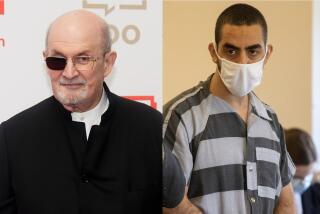Salman Rushdie makes peace -- with John Le Carre
- Share via
This is Salman Rushdie’s season of peacemaking.
No, the great Indian British novelist hasn’t forgiven the Iranian authorities who leveled a “Rushdie must die” fatwa against him back in 1989 for the perceived blasphemies in his novel “The Satanic Verses.”
Nor has he made peace, as far as we know, with his second wife, Marianne Wiggins, who is the subject of a most unflattering portrait in Rushdie’s new memoir, “Joseph Anton.”
But in that same book Rushdie did, in effect, apologize at length to his third wife, Elizabeth West, for the poor judgment he showed in leaving her for his fourth wife, Padma Lakshmi, the statuesque beauty he first met under the Statue of Liberty.
As he told The Times in an interview this summer: “There’s no way of writing a [memoir] in which everything you do is right.”
Then, last month, Rushdie threw out a literary olive branch to novelist John le Carré, one of several British writers who were critical of him during the years-long “Satanic Verses” controversy.
Fifteen years ago Rushdie called Le Carré “pompous,” and then “ignorant” and “semi-literate” after Le Carré presumed to criticize “The Satanic Verses” for attacking Islam.
The Guardian of London called their tiff, acted out in a series of newspaper letters, “one of the most gloriously vituperative literary feuds of recent times.”
At a British literary festival in October, Rushdie said of the exchange: “I wish we hadn’t done it” and said Le Carré’s “Tinker, Tailor, Soldier, Spy” was “one of the great novels of post-war Britain.”
Finally, this week, Le Carré said he too regretted the dispute. “I admire Salman for his work and his courage, and I respect his stand.”
ALSO:
Salman Rushdie steps from behind his alias
Paula Broadwell’s unenviable path to biographer fame
More to Read
Sign up for our Book Club newsletter
Get the latest news, events and more from the Los Angeles Times Book Club, and help us get L.A. reading and talking.
You may occasionally receive promotional content from the Los Angeles Times.









